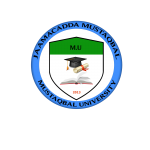Bachelor of Public Health
MU department of Public health was established to produce public health cadres who are capable of protecting and promoting health, and preventing disease and injury. Development of public health practitioners and scientists with the required competencies in the field is critical for the prevention of disease and disability and sustainability of the health system across Somalia and around the globe. Public health services are population based – that is, services which are focused on improving the health status of the population, as opposed primary care providers who respond to the treatment of individuals.
Program Competencies
By the end of the four year public health program, the graduates should be able to:
- Prevent disease, prolong life and promote human health through organized efforts and informed choices of society, organizations, public and private, communities and individuals. It is concerned with threats to health based on population health analysis.
- To recruit, retain and support faculty and staff in an environment that emphasizes professional development and excellence in scholarly and teaching endeavours.
- Design, develop, implement and evaluate strategies and interventions to improve individual and community health
- Evaluate effectiveness, accessibility, and quality of personal and population-based health services.
- Develop policies, plans and products that support individual and community health efforts.
- Advocate, inform, educate, and empower people about public health issues
- Respond quickly and effectively to emerging public health concerns, coordinating the response and enlisting the help of specialists as
- Apply the core public health research and evaluation skills in real world situations.
Program Duration
This is a four-year program. Every academic year consists of two 24-week semesters of 20 weeks for theory and 4 weeks for practical field attachment.
Admission Requirements
Admission criteria in health training programmes have far-reaching implications in education and training processes and the outcomes of such programmes, thus, the graduates and the quality of health services. Consideration of the admission requirements to the Community Health Nurse programme is in light of the prevailing health situation in Somalia.
Candidates for direct or in-service admission into the course programme must possess the stipulated qualification requirements in Somalia, and the equivalent, especially in neighboring countries.
Any student seeking admission from any MU Department of Nursing to pursue the course should fulfill the following requirements:
1. Be not younger than 18 years of age.
2. Submit secondary leaving certificate with minimum average marks of not less than 60% from recognized school and umbrella and passed the Somali Government centralized exam.
3. Application for admission.
4. Pay the registration and enrollment fees as per required.
5. Fill the application form fittingly.
6. Successfully pass the university entrance examination,
7. Bring the following documents with you:-
a. Original secondary certificate (both from the school & the government)
b. Original national identity card/passport/birth certificate
c. Two (2) certified clear sets of photocopies of (a) and (b)
d. Seven (7) certified passport sized photos
Assessment Approaches
Formative
Formative assessment is used as a bridge between learning and teaching. It allows instructors to gather real data about students as they work, then adjust their instruction to better serve students at their current learning level. In nursing education, formative assessment has been proven to be highly effective not only for student learning, but for faculty teaching and, as a result, increases the overall quality of learning. Formative assessment used in the department include; Continuous Assessment Tests, Assignments, Quizzes, Random Assessment Tests, End of Semester Examinations and Supplementary Examinations.
Summative
The goal of summative assessment is to evaluate student learning at the end of an instructional unit/module. Summative assessment include; Final Qualifying Examinations (theory), Final Qualifying Examinations (theory and practical), End of Semester Examinations, and Promotional Examinations.
Teaching Approach/Strategies
Teaching approach is a set of principles, beliefs, or ideas about the nature of learning which is translated into the classroom while teaching strategy is a long term plan of action designed to achieve a particular goal. These include the following; Informal Lectures/Discussions, Modified Lectures, Group Discussion, Small Group Discussions, Demonstrations and return demonstration, Role plays, Team Teaching, Project Assignments, Case Presentations, Nursing Care Studies, Self-Directed Learning, Programmed Learning, Simulations, Educational Trips, Film Shows and Problem Based Learning.
Teaching Aids/Instructional Materials
Include the following; Chalk Board, White Board, Flip Chart , Flip Charts Stand, Posters, Poster Stand, Videos, Videos tapes, Video camera, Slides, Slide Projectors, Models of various body parts/organs, Study guides, Lesson plans, Course outlines, Computers, Laptops, LCD projectors, Over Head Projectors, Human Skeleton, Dummies, Human Skeletons, Manikins, Simulators, Real Human Beings (Simulated Patients), and Real Human Body Parts.
